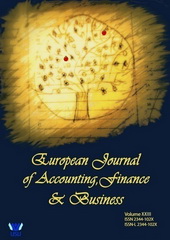|

ISSN: 2344 - 102X
ISSN-L: 2344 - 102X
Our journal is currently indexed in the following databases:
|
| |
Article from Volume 8, Number 2, Year 2020| CONSIDERATIONS REGARDING THE JAPANESE ACCOUNTING SYSTEM | 
Download | | Author(s): Anatol Melega | | DOI: 104316/EJAFB.2020.8210 | | Abstract: The economic evolution of a nation is closely correlated with the customs, accounting and fiscal regulations, characteristics, nuances, values, practices, customs that have developed since the emergence of the state. Without a preliminary analysis of these determinants, the task of understanding the Japanese accounting system or the Japanese economic system in general would be difficult to accomplish. In this paper we aim to analyze the Japanese accounting system together with all its particularities. | | Keywords: Accounting Profession; IFRS; Globalization; Harmonization | References:
1. Beaver, W.H., Ryan, G. (2005). Conditional And Unconditional Conservatorism: Concepts And Modeling. Review Of Accounting Studies, 10, 269-309.
2. Japan Exchange Group. (2020). Voluntary Application Of IFRS (Current And Scheduled). Retrieved April 15, 2020 From: Https://www.jpx.co.jp/english/listing/others/ifrs/index.html.
3. Mircea, M.C. (2013). Convergen?e Contabile Interna?ionale: Curs Universitar. ALMA MATER, Bac?u, Romania.
4. Neag, R., Ma?ca, E. (2015). Identifying Accounting Conservatoris – A Literature Review. Procedia Economics And Finance, 32, 1114-1121.
5. Nobes, C., Parker, R. (2004). Comparative International Accounting. 8th Edition, Prentice Hall-Financial Times, London, England.
6. Shimamoto, K., Takeda, F. (2020). IFRS Adoption And Accounting Conservatorism Of Japonese Firms With Governance System Transition. International Advances In Economic Research, 26, 161-173.
7. Tab?r?, N., Horomnea, E., Mircea, M.C. (2010). Contabilitate Interna?ional?. Tipo Moldova, Iasi, Romania.
8. Tsunogaya, M., Hellman, A., Scagnelli, S.D. (2015). Adoption Of IFRS In Japana: Challenges And Consequences. Pacific Accounting Review, 27(1), 3-27.
9. Walton, P., Haller, A., Raffournier, B. (2003). Internationa Accounding. 2 Edition, Thompson, London.
10. Ozu, C., Nakamura, M., Nagata, K., Gray, S.J. (2018). Transitioning To IFRS In Japan: Corporate Perceptions Of Costs And Benefits. Australian Accounting Review 28 (1): 4-13.
11. Business Accounting Council (BAC) 2009. The Interim Report: Application Of IFRS In Japan, June 2009.
12. *** Accounting And Disclosure System In Japan. Triangular System. Retrieved April 10, 2020 From: Http://www.hp.jicpa.or.jp/english/accounting/standards/archive01.html,
13. *** About FSAF: Objectives And Business. Retrieved April 10, 2020 From:https://www.asb.or.jp/en/fasf-asbj/overview.html.
14. *** About JIPCA: Key Responsibilities. Retrieved April 20, 2020 From: Https://jicpa.or.jp/english/about/.
|
| | Back to journal ... |
|
|
| |
|
|
|

